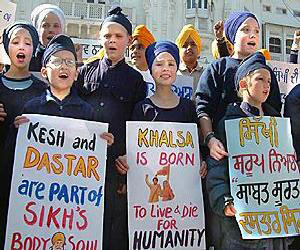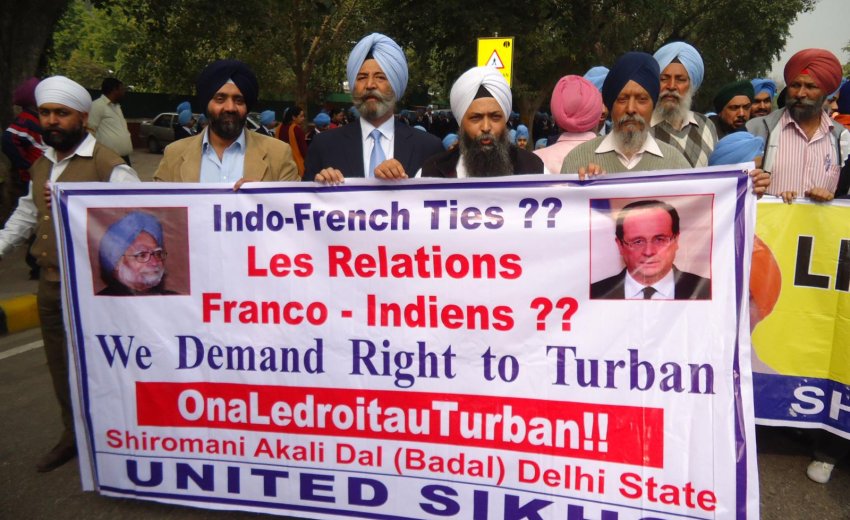London, UK - UNITED SIKHS lawyers announced today that they filed a legal challenge last Friday to the French law which banned the turban in public schools in 2004. The cases before the European Court of Human Rights (ECHR) in Strasbourg will be the first against France since it passed a law in March 2004 banning the wearing of conspicuous religious signs, including the Sikh turban, in public schools.
Mejindarpal Kaur, UNITED SIKHS Director for International Civil and Human Rights Advocacy said, "The small community of French Sikhs has gallantly fought these cases in the French courts for the last three years, supported by the global Sikh community. They are now in the highest human rights court in Europe not only to fight for their rights, but to protect the freedom of thought, conscience, and religion for all." said UNITED SIKHS director, Mejindarpal Kaur.
"We must salute them for fighting against all odds, despite being the smallest community to be affected by the law, and pray that justice will be done in the ECHR," she added.
The applicants, Jasvir Singh and Ranjit Singh, were 14 and 17 years old respectively when they were expelled from Michel High School in Bobigny for wearing a keski. A third student, Bikramjit Singh, who was 18 at the time, was also expelled in 2004 and UNITED SIKHS will be filing his appeal to the United Nations Human Rights Committee shortly. The keski is a small, discreet piece of cloth, which acts as an under-turban, covering the unshorn hair that is considered sacred in the Sikh religion. It is frequently worn by young Sikhs as a prelude, or as an alternative, to wearing a larger turban.
The principal of the high school asked the applicants to stop wearing the keski to school, but the applicants declined to do so because it represents a fundamental aspect of their religion, beliefs, and identity. The applicants were initially removed from the classroom and made to sit in a separate study area in order to pursue their education. They were placed in the school canteen, where they undertook self-study and were provided with educational materials by a teaching assistant if they requested them. No teacher taught them during the period of three weeks that they spent in the canteen. This separation continued for three weeks before they were excluded from school altogether.
"I am now studying law at Sorbonne University, wearing a turban. This is proof that there is nothing wrong with the French system. What is wrong is the law that banned the turban in schools and we hope the ECHR will give us justice." said Ranjit Singh,21, one of the applicants to the ECHR.
 The applicants were out of school for one year following their exclusion. The following year, a Catholic school, Lycei Fenelon, which had refused them entry immediately after the exclusion, admitted them to finish their high school. Jasvir Singh is now in his final year at Lycei Fenelon, and Ranjit Singh is a second year law and economics student at Sorbonne University.
The applicants were out of school for one year following their exclusion. The following year, a Catholic school, Lycei Fenelon, which had refused them entry immediately after the exclusion, admitted them to finish their high school. Jasvir Singh is now in his final year at Lycei Fenelon, and Ranjit Singh is a second year law and economics student at Sorbonne University.
France's highest administrative court, the Conseil D'Etat, ruled in December 2007 that "having regard to the interest which attaches to respect for the principle of secularism in public educational institutions," the expulsion of the three boys did not involve an excessive interference with the freedom of thought, conscience, and religion guaranteed by Article 9 of the European Convention on Human Rights (EHCR), nor did the expulsion offend against the principle of non-discrimination laid down by Article 14 of the same convention.
In the appeal filed to the ECHR, UNITED SIKHS lawyers argued that the 2004 law interfered with the applicants human rights in a way that was disproportionate to the aim of the protection of the rights and freedoms of others. The lawyers added, there was no pressing social need which dictated that members of the very small Sikh minority in France should not be able to wear a discreet head-covering. Moreover, a Sikhs uncut hair is a much more conspicuous sign of adherence to the Sikh religion than the keski which covers it.
Accordingly, requiring a Sikh pupil to remove his keski, revealing his uncut hair tied in a tress knot, makes his religious affiliation more conspicuous rather than less.
UNITED SIKHS will also apply to the ECHR for permission to intervene in the case on behalf of the wider Sikh community and in support of the freedom of thought, conscience, and religion. Since the expulsions in 2004, three more Sikh students have been expelled in the following years - Gurinder Singh, Maha Singh, and Jasmeet Singh, whose cases are still being dealt with in the French courts.
Ranjit Singh, 21, one of the applicants to the ECHR said, "I am now studying law at Sorbonne University, wearing a turban. This is proof that there is nothing wrong with the French system. What is wrong is the law that banned the turban in schools and we hope the ECHR will give us justice."
Stephen Grosz of Bindmans LLP, the applicants' London lawyer and an eminent human rights specialist, commented, "This case raises an important issue of the extent to which the protection of human rights requires states to acknowledge and respect the diversity which is the hallmark of a democratic society."
Cynthia Morel, Minority Rights Group International's Senior Legal Advisor, who acts as legal research consultant for the cases, also remarked on the case, stating, "This case demonstrates that focus on equality in its purest sense leaves a range of minorities and vulnerable groups behind. It is imperative that France officially recognises its minorities and adopt special measures to meet their needs."
Kudrat Singh, a past president of UNITED SIKHS (France), who worked tirelessly on the cases when they were in the French courts, also offered his comments: "When I joined the panth (Sikh path), I did not expect to have to fight so vigorously for the principle of live and let live. The journey has been long and we faced many difficulties. From today, I can leave the matter to the consciousness of mankind, in other words I leave it to God."
"As Sikhs we are committed to stand up for the rights of others," stated Gurdial Singh, president of the French Turban Action Committee, who is also the father of one of the applicants, Jasvir Singh. "This time our rights are being trampled upon and we had to fight for ourselves, knowing that everyone who believed in the freedom of religion will benefit," he added.
Since the passing of the controversial French law banning the Sikh turban in public schools, three Sikhs (Shingara Singh, Ranjit Singh and Manjit Singh) have also been denied their driving licence, passport, refugee card, and ID card because they refused to remove their turban for their ID photo. Last June, UNITED SIKHS filed an appeal on behalf of Shingara Singh, who was refused his driving licence, and will soon be filing appeals to the UN Human Rights Committee for Shingara Singh's passport refusal and Ranjit Singh's refugee card refusal. Manjit Singh's case will soon be filed in the French administrative court.
"This case raises an important issue of the extent to which the protection of human rights requires states to acknowledge and respect the diversity which is the hallmark of a democratic society." says Stephen Grosz of Bindmans LLP, the applicants' London lawyer and an eminent human rights specialist.
-
View a film "Fighting for My Crown", which highlights the plight of those affected by the turban ban.
-
Read more about "Sikhs in French history"
-
Read more about "The Right to Turban Campaign".
Jasvir Singh and Ranjit Singh are represented by Stephen Grosz, partner and head of public law and human rights in the London law firm Bindman LLP and human rights counsels, Rabinder Singh QC of Matrix Chambers, London, and Schona Jolly of Cloisters Chambers, London.
For more information please contact :
Mejindarpal Kaur
Director
International Civil and Human Rights Advocacy
UNITED SIKHS
